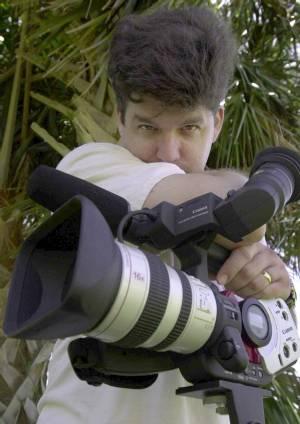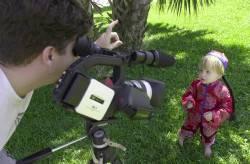 |
Dr. Terry Cronin of Melbourne Beach uses a Canon XL1 in his digital
filmmaking. Image copyright © 2000, Craig Rubadoux, FLORIDA TODAY.
|
Filmmakers adopt digital video
Elegant editing, portable cameras entice directors
By Chris Kridler
FLORIDA TODAY
A digital revolution is giving filmmakers the power to travel light - and the rest of
us the power to be filmmakers.
With the advent of relatively inexpensive digital video cameras and home-computer-based
editing systems, indie directors with a lot of ambition and a little money can develop
movies their predecessors could barely dream about.
"The Blair Witch Project" set the standard for cheap success with its
digitally edited mixture of film and Hi8 (high-quality 8mm) video. Now directors as
big-time as Spike Lee and Mike Figgis are getting into the act as the technology matures.
"The digital filmmaking for me kind of came as a sideline to my career as a
filmmaker," Maxie Collier, 31, said from Los Angeles. His www.dvfilmmaker.com is dedicated to the
art.
Now that he's producing and directing a documentary on hip-hop that will take him and
his crew across the country, "I couldn't even imagine doing it in film."
Where a conventional film costs hundreds of thousands of dollars or more to shoot and
process, some independent feature films are coming in for $100,000 or less. Though the
look of video is different - and not as rich, some say - it offers a high-quality
alternative.
Digital also is giving hobbyists the chance to edit their movies, using simple
software, such as iMovie, which comes with Apple Macintosh DV computers ($1,500 for the
high-end iMac DV); and programs such as Adobe Premiere (about $550) and Final Cut Pro
(about $1,000). Another option is a $2,000 Canopus DVRex-M1 system, which includes
hardware and software for capturing and editing video.
The computer costs extra.
"I'm using a Windows-based PC, and it actually has a very large hard drive so I
can put a lot of information into the hard drive," said Dr. Terry Cronin of Melbourne
Beach, a member of the Space Coast Filmmakers and a partner in 3 Boys Productions.
"Video takes a lot of memory."
With an 18-gigabyte hard drive, he can store about 30 minutes of video at a time.
That's usually fine, since Cronin, a dermatologist, makes short films to show in local and
regional festivals. He imports the footage to his computer with Canopus and edits the film
with Media Studio Pro.
He once shot a 15-minute movie, "Under the Bridge," on 16mm film. "It
cost about $1,400 to make that," he said. "That's pretty prohibitive. That's
outrageous. You can't expect to make a giant movie unless you really have a lot of
money."
Having shot movies since he was a kid, Cronin wanted a way to do it more cheaply.
"Film is very, very expensive," he said. "I started investigating more and
more the DV technology."
He invested in a Canon XL1, a high-end "prosumer" (professional consumer)
video camera that uses miniDV tapes and has interchangeable lenses.
"An hour tape costs about $15," he said. Once you have the equipment,
"your price for a movie goes way down, and it looks really nice."
To transfer videotape to 35mm film - to enter it in a film festival, for instance - you
might pay about $1,900 for a five-minute movie. But a filmmaker still saves tremendously
by shooting on video in the first place.
Digital isn't likely to supplant film anytime soon, said Steve Wallen, director of the
film and video department at Florida Metropolitan University in Melbourne.
"I kind of look at film, where you've got your 16 and 35 (mm)," he said,
"and those cameras haven't changed since they were invented at the turn of the
century."
"Not all digital is created equal," he added. Though the DV standard was
conceived by a consortium of 10 companies, variations exist. Among them are Sony's DVCAM
and Panasonic's DVCPRO. And Sony has created Digital 8 camcorders that can record digital
video onto 8mm tapes.
Easy editing
"I think it's got a lot of potential," Wallen said. "And I like the fact
that you can compose things in more of a traditional movie format, a widescreen format
(with some cameras). I like the fact that you can go right from the camera into the
computer."
An advantage in editing digital video is that with a high-speed connection - referred
to as IEEE-1394, i.LINK or FireWire cable - the signal can be transmitted to a computer
without a loss in quality, then exported back to the camera or to another device.
Another advantage is that video can be edited in a nonlinear fashion - clips can be
dubbed to the computer, saved and rearranged without a lot of tedious rewinding and
fast-forwarding. Transitions and titles can be added easily, and soundtracks can be
manipulated.
 |
Dr. Terry Cronin films son Daniel, 2. Image copyright © 2000, Craig
Rubadoux, FLORIDA TODAY.
|
With film, you slice and put the pieces back together. "Now I can just do it by
moving my mouse or different keys," Wallen said.
At the college, his students use Media 100 xr, which - with its own hardware and the
computers it runs on - amounts to a $50,000 system.
FMU student Robert Mutchler, 26, of Indialantic edits video more inexpensively at home.
He uses a PC running Windows NT with a Perception Video Recorder - essentially two cards,
one that allows input from the camera, another that allows output of the footage. He edits
with Adobe Premiere and adds effects and animation with Adobe After Effects and LightWave
3D.
"I've always liked special-effects films, and I always wanted to get more
involved," he said. He wants to be an editor, and his classes at FMU, along with the
contacts he's made there, have allowed him to gain invaluable experience.
Though he says his system is "obsolete" now, "I can still do some good
stuff, some really killer stuff with what I have."
In other words, it's not just about how new the equipment is. "If someone wants to
start doing something like this, it's best to go to school," Mutchler said.
Versatile art
Collier and his crew are finding digital camcorders invaluable in making "Paper Chasers," their
documentary about hip-hop entrepreneurship.
This spring, they'll take a recreational vehicle to Houston, Baton Rouge, New Orleans,
Atlanta, Miami, Washington, New Jersey and New York. "We're driving across the
country, interviewing hip-hop entrepreneurs in music, fashion, print," said Collier,
who grew up in Columbia, Md.
The filmmakers will be subjects in the movie, too. They'll use a variety of digital
video cameras and supplement the footage with a digital camera that can take a few seconds
of video, for diary entries and Web-site content. The RV will also have wireless Internet
so they can post images to the Web as they go.
Collier sees no clash between film and digital video. If he has the chance to interview
big names for his project, he wants to do it on film.
"It's all about expanding our resources, rather than seeing it as some sort of
conflict," he said.
Meanwhile, we can look for more digital filmmaking on the big screen. George Lucas is
shooting the next "Star Wars" film digitally. Spike Lee just shot a digital
movie set in the world of TV sitcoms called "Bamboozled."
Perhaps most radical is Mike Figgis' "Time Code," which uses digital video
cameras to follow four characters in real time, their stories appearing simultaneously on
the screen. It comes out in May.
Thanks to the accessibility of digital moviemaking, the next Lucas or Lee or Figgis
might come out of your own neighborhood.
"I see the digital as a big thing out there for a lot of
people," FMU's Wallen said. "Certainly more for the masses, now, it's going to
be easy to take digital video and input it."
Read more technology
stories